|
|
|
Sort Order |
|
|
|
Items / Page
|
|
|
|
|
|
|
| Srl | Item |
| 1 |
ID:
183856
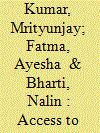

|
|
|
|
|
| Summary/Abstract |
Affordable access to medicines is a key determinant of a country’s resilience to health crises. The modern hyper-connected international trade and production networks have a vital role to play in ensuring this accessibility, especially in the context of a pandemic. This article focuses on medicines and medical equipment and analyses the synergistic role of the two international organisations—The World Trade Organisation (WTO) and The World Health Organisation (WHO), in assuring affordable access to these goods globally. WHO is responsible for global healthcare regulations; however, the medical supply chain originates in a few developed countries, manufactured in bulk (in case of medicine) at low cost in developing countries, and finally traded worldwide. Here, the role of WTO comes in where it facilitates global trade cooperation and intellectual property rights monitoring, both key elements in medical goods production and trading. Despite the need for cooperation in mitigating COVID-19, much of the global response to COVID-19 has been fragmented and inward-looking. This lack of coordination has serious repercussions especially for developing countries. We use qualitative content analysis methodology, connecting concepts of cooperation theory and global governance to identify the joint role of the two organisations in fostering global cooperation in medical goods accessibility.
|
|
|
|
|
|
|
|
|
|
|
|
|
|
|
|
| 2 |
ID:
174551
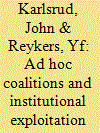

|
|
|
|
|
| Summary/Abstract |
While the increasingly thick web of global, regional and sub-regional security arrangements and institutions has received ample scholarly attention, the phenomenon of ad hoc military coalitions and how they impact these institutions has been relatively little explored. We examine ad hoc coalitions in international security responses and develop a tentative typology of military responses that takes ad hoc coalitions into consideration, where we differentiate in terms of institutionalisation and duration. Following a rational-choice institutionalist logic, we argue that institutional proliferation increases the chances of institutional exploitation. We illustrate this with how states apply a pick-and-choose approach in which institutional products but not frameworks are used. They use the interoperable forces, a common culture and mainstreamed doctrine, but not the formal deployment of rapid response mechanisms of eg the North Atlantic Treaty Organization and the African Union. In closing, we observe that institutional proliferation in international security facilitates a functionalist approach mainly inspired by national self-interest. Future research should examine whether this could result in dwindling relevance of international institutions, first in the domain of security, but later also in other domains.
|
|
|
|
|
|
|
|
|
|
|
|
|
|
|
|
| 3 |
ID:
184224
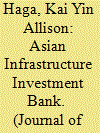

|
|
|
|
|
| Summary/Abstract |
In 2013, China's growing economic capacities motivated Beijing to launch a multilateral bank to advance its diplomatic agenda. Scholars are still debating precisely what Beijing seeks to accomplish through the Asian Infrastructure Investment Bank (AIIB). This article surveys the key literature on the AIIB, identifying twenty scholarly interpretations of Beijing's strategic goals. The purpose of this research is to understand Beijing's initial design for this bank and evaluate whether this new multilateral development bank can function as an effective instrument for Beijing's economic statecraft. Over its first five years, as an economic tool for Beijing, the AIIB has performed quite remarkably well. The bank not only operates smoothly, generating a reasonable amount in net income for its shareholders, but also serves Beijing's strategic purposes in expanding China's regional influence, enhancing its international status, and ascending toward global leadership.
|
|
|
|
|
|
|
|
|
|
|
|
|
|
|
|
| 4 |
ID:
175440
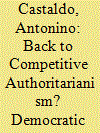

|
|
|
|
|
| Summary/Abstract |
Despite growing concerns expressed by international organisations about the deterioration of democracy in Vučić’s Serbia, the country has been neglected by the literature on the ‘crisis of democracy’. Using a combined qualitative/quantitative research strategy for detecting changes in regime types, including various V-DEM measures and over three dozen indicators provided by the competitive authoritarian framework, the analysis confirms the recent regression of Vučić’s Serbia to competitive authoritarianism. The peculiar features of the Serbian case—a double transition to and from democracy in less than two decades—appear to support a pessimistic outlook for the future of democracy.
|
|
|
|
|
|
|
|
|
|
|
|
|
|
|
|
| 5 |
ID:
187030
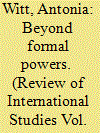

|
|
|
|
|
| Summary/Abstract |
International organisations (IOs) are said to command growing levels of authority. But in studying this phenomenon, scholars predominantly focus on the formal capacities member states assign to IOs. Much less attention is paid to the effects of IO authority, that is, how authority is exerted in practice and what it does within the affected societies. Based on a case study of the African Union's (AU) anti-coup regime, I make the case for a ‘bottom-up’ approach to IO authority, focusing on its localised enactment and effects. Analysing the AU's authority through a governmentality lens and drawing on several months of field research, I show that the AU's authority to govern coups is indeed effective: in commanding the re-establishment of constitutional order, the AU prescribes a particular imaginary of political order to resolve conflict and shapes the conduct of political actors in affected states by inscribing them into this order. But rather than operating in a top-down, direct way, the AU's authority is enacted in a distant, diffuse manner. Although based on formal powers assigned to the AU, neither the way this authority is exercised nor its effects can be inferred merely from these formal powers.
|
|
|
|
|
|
|
|
|
|
|
|
|
|
|
|
| 6 |
ID:
160899
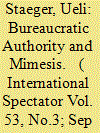

|
|
|
|
|
| Summary/Abstract |
Regional economic integration in the post-Soviet space stands in a complex relation with the European Union’s integration process. Multiple competing internal logics of integration, as well as the EU model are drivers of Eurasian regionalism. The Eurasian Economic Union illustrates how bureaucracies mobilise their technocratic authority in a process of mimesis that reconciles multiple internal and external integration logics: selective learning from the EU and successful incorporation of internal integration logics produce an organisational design and output that member states support to varying extents.
|
|
|
|
|
|
|
|
|
|
|
|
|
|
|
|
| 7 |
ID:
155159
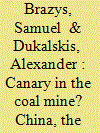

|
|
|
|
|
| Summary/Abstract |
How China assumes its position of superpower is one of the most important questions regarding global order in the twenty-first century. While considerable and sustained attention has been paid to China’s growing economic and military might, work examining how China is attempting, if at all, to influence the ecosystem of global norms is in its earlier stages. In this article we examine China’s actions in an important venue for the development of global norms, the United Nations General Assembly (UNGA). Using a unique dataset that captures how other countries move into or out of alignment with China on UNGA resolutions that are repeated over time, we find statistical evidence that China used diplomatic and economic means in an attempt to subtly alter international norms. We further illustrate these findings by examining four states that made substantive moves toward China on resolutions concerning national sovereignty, democracy, international order, non-interference, and human rights.
|
|
|
|
|
|
|
|
|
|
|
|
|
|
|
|
| 8 |
ID:
166767
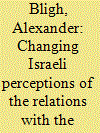

|
|
|
|
|
| Summary/Abstract |
Since 1948/1949 The International Committee of the Red Cross (ICRC) has been synonymous in the Arab–Israeli context with processes of exchanging prisoners and caring for human lives. After the 1967 war the ICRC changed in status from that of a mediator to that of the executive arm of larger forces. The processes leading to the partial demise of the ICRC are clearly identified in retrospect. It has to do with the asymmetry of perceptions between Israel and the organisation. Israel did not agree to the application of the Fourth Convention in the territories. The ICRC believed that this population fell under the Convention and therefore under the ICRC. Furthermore, the ICRC failed in getting the Israeli POWs back home, especially after the conclusion of the War of Attrition in 1970. The resulting feelings eliminated in the Israeli decision makers' minds the role that the ICRC saw for itself in future POW exchange deals. After the 1973 war the ICRC would lose its position as a negotiator, leaving that arena to other international actors.
|
|
|
|
|
|
|
|
|
|
|
|
|
|
|
|
| 9 |
ID:
179323
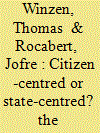

|
|
|
|
|
| Summary/Abstract |
As a result of the spread of International Parliamentary Institutions (IPIs), international organisations face crucial questions of representational design. We introduce a distinction between citizen-centred and state-centred IPIs in international organisations (IO). Drawing on original data, we show that, even though parliaments might seem likely to foster citizen representation in the international realm, they in fact often follow state-centred representational designs. We further find that citizen-centred IPIs are a near exclusive phenomenon of a few, democratic regional integration projects. Given the prevalence of state-centred representational designs, we conclude that IPIs’ potential to represent different cross-border communities, concerns, and conflict lines than intergovernmental IO bodies remains institutionally limited. IPIs are thus unlikely to challenge these bodies in similar ways as often observed in the relationship between the European Parliament and the European Union's Council of Ministers.
|
|
|
|
|
|
|
|
|
|
|
|
|
|
|
|
| 10 |
ID:
144104
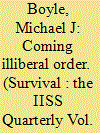

|
|
|
|
|
| Summary/Abstract |
In a July 2014 speech in Băile Tuşnad, Romania, recently re-elected Hungarian Prime Minister Viktor Orbán declared that it was time for Hungary to ‘abandon liberal methods and principles of organizing society’ and to embark upon a project of building a new ‘illiberal state’. Citing China, Russia, Singapore, India and Turkey as models, Orbán argued that the liberal-democratic model had performed poorly compared to authoritarian states and illiberal democracies during the financial crisis in 2008. Throughout that crisis, he noted, it was illiberal states – as he put it, ‘systems that are not Western, not liberal, not liberal democracies, maybe not even democracies’ – which proved more successful in responding to global economic turmoil. While he acknowledged that liberal values retained a degree of attractiveness, Orbán argued that it was important for states to cut themselves loose of the legal restrictions imposed by liberal democracy and to engage in a new type of economic nationalism to ensure that their interests were protected in the global economy.
|
|
|
|
|
|
|
|
|
|
|
|
|
|
|
|
| 11 |
ID:
117198
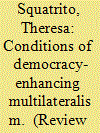

|
|
|
|
|
| Publication |
2012.
|
| Summary/Abstract |
As argued in a recent article by Keohane, Macedo, and Moravcsik, 'democracy-enhancing multilateralism' highlights the potential ways in which international organisations can enhance domestic democracy. The thesis raises an important question about the conditions which shape the likelihood that multilateralism will have such democratising effects. This article responds to the question of conditionality, looking at one way in which democracy may be improved by multilateralism-through the expansion of rights protections. That is, under what conditions will domestic democratic processes garner an improved ability to protect rights as a result of a state's participation in multilateral institutions? Using most likely empirical cases - the European Union (EU) and the Council of Europe (COE) - this article argues that three conditions affect the likelihood that rights expansion will result from multilateral legal institutions. Together the compatibility between the international legal principle and pre-existing domestic law, legal mobilisation, and the precision and obligation of the international law have significant affect on the likelihood of rights expansion. The unique contribution here is a set of conditions that helps to understand when and where rights are likely to expand as a result of a state's participation in international organisations.
|
|
|
|
|
|
|
|
|
|
|
|
|
|
|
|
| 12 |
ID:
196662


|
|
|
|
|
| Summary/Abstract |
How do international organisations (IOs) respond to existential challenges such as membership withdrawals or budget cuts? Some IOs manage to ignore the challenge or adapt to the demands of the challenging state whereas others build institutional capacities to resist the pressure. Yet, we know little about the internal dynamics that shape IOs’ responses to such challenges. This article investigates to what extent IOs’ threat perception determines the intensity and direction of their responses to crises. Using the League of Nations’ responses to early crises as an explorative historical case study, the analysis shows that a timely and homogenous perception of a crisis leads to a more assertive and substantial response. Two broader conclusions can be drawn from the analysis for IO research. First, the role of international bureaucrats should not be underestimated in shaping an IO’s response to crises. Second, the findings indicate that a more nuanced perspective on the League’s crisis management can help overcome the failure narrative that dominates the current understanding of the League in International Relations research.
|
|
|
|
|
|
|
|
|
|
|
|
|
|
|
|
| 13 |
ID:
161271
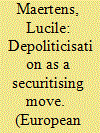

|
|
|
|
|
| Summary/Abstract |
Created in 1972, the United Nations Environment Programme (UNEP) has a normative mandate to promote the protection of the environment at the international level. However, since 1999, the organisation has been conducting field assessments in postconflict situations and addressing the role of natural resources in conflict, framing the environment as a security issue. To do so, the programme insists on its neutrality as a technical and ‘apolitical’ actor within the UN system. Considering depoliticisation as a political act, this article unpacks the concrete practices by which international organisations (IOs) enact depoliticisation. It further argues that IOs can perform securitising moves through practices and techniques presented as outside of the political realm. It draws upon the recent work on depoliticisation at the international level and reinforces studies considering the links between (de)politicisation and securitisation.
|
|
|
|
|
|
|
|
|
|
|
|
|
|
|
|
| 14 |
ID:
073057
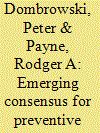

|
|
|
|
|
| Publication |
2006.
|
| Summary/Abstract |
After u September 2001, the George W. Bush administration declared that the United States had adopted a 'pre-emptive' military doctrine to address new threats posed by terrorists and 'rogue states' armed with nuclear, biological or chemical weapons. However, the so-called 'Bush Doctrine' met substantial international opposition when it was proposed - and even more resistance when it was applied to the case of Iraq. Subsequent events in Iraq have not made the idea any more popular. It is somewhat startling, then, that numerous states and international organisations seem now to support the call to revise long-held international understandings about when force might be used. A sizable number agree that the risk of calamitous surprise attacks, especially with nuclear, biological or chemical weapons, might justify preventive strikes or wars against terrorists or their state sponsors. Anew international norm may thus be under construction, though states continue to disagree about the agents of decision and action.
|
|
|
|
|
|
|
|
|
|
|
|
|
|
|
|
| 15 |
ID:
143574
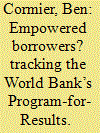

|
|
|
|
|
| Summary/Abstract |
The World Bank has developed a new lending instrument, called Program-for-Results (P4R). This instrument is notable because it emphasises borrower programmes and contexts, ostensibly shifting from universally applied Washington Consensus models. Why did the Bank develop P4R? First, theoretical grounds for a new Bank policy are outlined. Second, the context, formalisation and usage of P4R are analysed. Third, P4R’s possible futures are described, along with their implications for development lending theory and practice. Despite its embryonic status, scholars and practitioners will be able to learn about power in development lending by following the fate of P4R.
|
|
|
|
|
|
|
|
|
|
|
|
|
|
|
|
| 16 |
ID:
122837
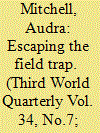

|
|
|
|
|
| Publication |
2013.
|
| Summary/Abstract |
There is a growing global demand for Northern universities to provide fieldwork opportunities in 'conflict zones' to students in applied International Relations (peace and conflict studies, post-conflict studies, human rights, development and related fields). This demand is generated in macro-level or structural dynamics emerging from three sources: the hiring criteria of major international organisations, competition between universities for fee-paying students and the social commodification of 'authentic' or 'real' life experience. At the micro level these dynamics can manifest themselves in exploitative relations, two of which are explored here. First, substantial inequalities (or a 'benefit gap') may arise between student researchers and their research subjects. Second, student researchers may find themselves in extractive relations with their research subjects. These dynamics lead to a situation in which some of the world's most vulnerable people are objectified as learning resources for students enrolled in (predominantly Northern) universities. The article argues that these dynamics are a problem of global politics, not just research ethics or pedagogy. It concludes with recommendations for reducing the potential for exploitation in educational fieldwork.
|
|
|
|
|
|
|
|
|
|
|
|
|
|
|
|
| 17 |
ID:
128842
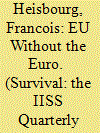

|
|
|
|
|
| Publication |
2014.
|
| Summary/Abstract |
The single currency was supposed to have led to greater political union, but the policies taken to ensure its survival are having the opposite effect. An orderly retreat from the euro might be the EU's least-bad option. As the euro area enters its seventh year of economic stagnation, the future of the European integration process remains in suspense. In the medium-to-long term, highly divergent scenarios remain possible, with variable degrees of likelihood, from full-blown federalisation at one extreme to the catastrophic collapse of the euro and of the European Union at the other. Somewhere in between comes the actual set of policies currently followed, sometimes described as 'muddling through', more aptly called 'muddling down' in terms of its effects on growth and mass unemployment. Since the middle of 2012, the mix of recessive policies of 'internal devaluation', limited pooling of eurozone liabilities and decisive intervention by the European Central Bank (ECB) have deferred for an undetermined period of time the risk of a disorderly break-up of the euro. The strategic consequences of this range of potential and actual policy paths have been discussed in previous issues of Survival.
|
|
|
|
|
|
|
|
|
|
|
|
|
|
|
|
| 18 |
ID:
125010
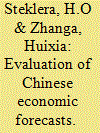

|
|
|
|
|
| Publication |
2013.
|
| Summary/Abstract |
This paper analyses the real GDP growth and inflation forecasts prepared by the International Monetary Fund, the Organization for Economic Cooperation and Development, and the private forecasters between 1999 and 2010. The empirical results show that the long-term growth forecasts were inferior to a naïve model and were biased. The average of a number of short-term private forecasts dominated those made by the international organisations.
|
|
|
|
|
|
|
|
|
|
|
|
|
|
|
|
| 19 |
ID:
142232
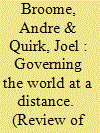

|
|
|
|
|
| Summary/Abstract |
Benchmarking practices have rapidly diffused throughout the globe in recent years. This can be traced to their popularity amongst non-state actors, such as civil society organisations and corporate actors, as well as states and international organisations (IOs). Benchmarks serve to both ‘neutralise’ and ‘universalise’ a range of overlapping normative values and agendas, including freedom of speech, democracy, human development, environmental protection, poverty alleviation, ‘modern’ statehood, and ‘free’ markets. The proliferation of global benchmarks in these key areas amounts to a comprehensive normative vision regarding what various types of transnational actors should look like, what they should value, and how they should behave. While individual benchmarks routinely differ in terms of scope and application, they all share a common foundation, with normative values and agendas being translated into numerical representations through simplification and extrapolation, commensuration, reification, and symbolic judgements. We argue that the power of benchmarks chiefly stems from their capacity to create the appearance of authoritative expertise on the basis of forms of quantification and numerical representation. This politics of numbers paves the way for the exercise of various forms of indirect power, or ‘governance at a distance’, for the purposes of either status quo legitimation or political reform.
|
|
|
|
|
|
|
|
|
|
|
|
|
|
|
|
| 20 |
ID:
164434


|
|
|
|
|
| Summary/Abstract |
Human rights violations committed by international organisations (IOs) have raised demands that IOs should be held accountable for their decisions, policies, and actions. However, traditional forms of accountability have often failed in the context of global governance. This article introduces pluralist accountability as a form of accountability whereby third parties hold IOs and their implementing partners accountable for human rights violations. In pluralist accountability, third parties set the standards for IOs’ actions in relation to human rights, review their behaviour and impose normative or material sanctions in case of misbehaviour. The article further reveals two conditions that foster the development of pluralist accountability, namely the competition among third parties and the degree of vulnerability of the implementing actors or the mandating authority with regard to human rights demands. This argument is illustrated with empirical insights from peace operations in Bosnia and Kosovo, which were accused of human trafficking and the violation of the rights of detainees.
|
|
|
|
|
|
|
|
|
|
|
|
|
|
|
|
|
|
|
|
|